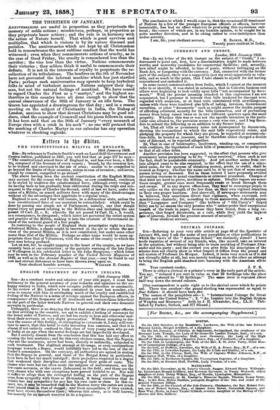ENGLISII TREATMENT OF NATIVE INDIANS.
12th January 1858.
Sin—As a constant reader and admirer of your able paper, I must bear testimony to the general accuracy of your remarks and opinions on the un- happy mutiny in India, which now occupies public attention so constantly. In the review of Mr. Ludlow's book contained in your last. number, you seem to concur with him in attributing much of the cruelty and embittered feeling of the Natives to a sense of revenge against the European officers, in consequence of the frequency of ill treatment and contumelioua behaviour on the part of the latter towards Natives in general and their own domestic servants in particular. Unhappily, there is no denying the fact that many of the younger officers, on first arriving in the country, are apt to exhibit a feeling of eontempt for the lower order of Natives, and are but too ready to beat and otherwise mal- treat their servants on very slight provocation. Without stopping to dis- cuss the causes of this feeling, or attempting to extenuate it, I may still ven- ture to assert, that this habit is daily becoming less common, and that it is almost if not entirely confined to that clam of very young men who go out to India at an age when the moral feelings are but imperfectly developed. But I entirely dissent from the conclusion that this has had any effect in causing the late mutinies ; and for this very obvious reason, that the Sepoys, who are the mutineers, never had been, directly or indirectly, subjected to such treatment. The slightest attempt at ill-usage, or even contumelious language towards a Sepoy, would infallibly have led to the loss of the of- fender's commission. On the contrary, all authorities are agreed in stating that the Sepoys in general, and those of the Bengal Army in particular, have been in fact too much indulged ; their prejudices respected to a degree that weakened their 'discipline and encouraged their pride of caste. The classes who were but too often made the subjects of maltreatment, are the low-caste servants, or the rivets (labourers) in the field ; and those are the very classes who with rare exceptions have proved faithful to us. Nor will it suffice to allege that the revengeful feeling on the part of the 'Sepoys arose from sympathy with those so ill-treated, it being notorious that no Asiatic has any sympathies for any but his own caste or class. In this re- spect, too, it may be remarked that in the Madras Army the metes are much more mixed than in that of siengal ; and these sympathies, if they existed, must have shown themselves there ; whereas this army, as is well known, has scarcely for an instant wavered in its ailegituicc.
The conclusion to which I would come is, that the occasional ill-treatment of Natives by a few of the younger European officials or officers, however lamentable, has had no effect whatever in producing this mysterious out- break ; the causes of which are, in my humble opinion, to be sought for in quite another direction, and to be owing rather to over-indulgence than undue severity. I am, Sir, your obedient servant, R. Rusin, M.D.,
Twenty years resident in India.


































 Previous page
Previous page